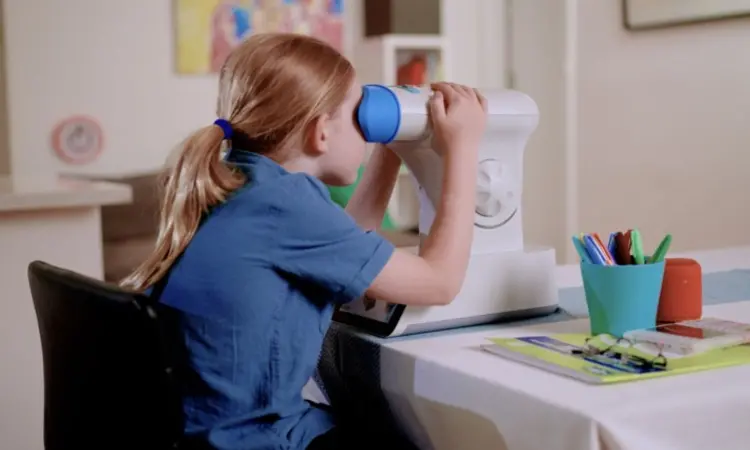- Home
- Medical news & Guidelines
- Anesthesiology
- Cardiology and CTVS
- Critical Care
- Dentistry
- Dermatology
- Diabetes and Endocrinology
- ENT
- Gastroenterology
- Medicine
- Nephrology
- Neurology
- Obstretics-Gynaecology
- Oncology
- Ophthalmology
- Orthopaedics
- Pediatrics-Neonatology
- Psychiatry
- Pulmonology
- Radiology
- Surgery
- Urology
- Laboratory Medicine
- Diet
- Nursing
- Paramedical
- Physiotherapy
- Health news
- Fact Check
- Bone Health Fact Check
- Brain Health Fact Check
- Cancer Related Fact Check
- Child Care Fact Check
- Dental and oral health fact check
- Diabetes and metabolic health fact check
- Diet and Nutrition Fact Check
- Eye and ENT Care Fact Check
- Fitness fact check
- Gut health fact check
- Heart health fact check
- Kidney health fact check
- Medical education fact check
- Men's health fact check
- Respiratory fact check
- Skin and hair care fact check
- Vaccine and Immunization fact check
- Women's health fact check
- AYUSH
- State News
- Andaman and Nicobar Islands
- Andhra Pradesh
- Arunachal Pradesh
- Assam
- Bihar
- Chandigarh
- Chattisgarh
- Dadra and Nagar Haveli
- Daman and Diu
- Delhi
- Goa
- Gujarat
- Haryana
- Himachal Pradesh
- Jammu & Kashmir
- Jharkhand
- Karnataka
- Kerala
- Ladakh
- Lakshadweep
- Madhya Pradesh
- Maharashtra
- Manipur
- Meghalaya
- Mizoram
- Nagaland
- Odisha
- Puducherry
- Punjab
- Rajasthan
- Sikkim
- Tamil Nadu
- Telangana
- Tripura
- Uttar Pradesh
- Uttrakhand
- West Bengal
- Medical Education
- Industry
Repeated low-level red light therapy exhibits clinical significance as short-term alternative for childhood myopia control: Study

Egypt: Repeated Low-Level Red Light (RLRL) treatment for childhood myopia treatment demonstrated significant benefits over single-vision spectacles, recent research published in BMC Ophthalmology has revealed.
The systematic review and meta-analysis showed that RLRL treatment demonstrated significant benefits in terms of reducing axial length (AL), positively impacting subfoveal choroidal thickness (SFCT), and improving spherical equivalent refraction (SER) over a 3, 6, and 12-month follow-up.
"Repeated Low-Level Red Light exhibited clinical significance as a short-term alternative for myopia control with good user acceptability and no documented functional or structural damage," the researchers wrote. However, the long-term effects of RLRL treatment and the rebound effect after cessation require further investigations."
According to the researchers, this is the first systematic review and meta-analysis investigating only randomized controlled trials (RCTs) evidence supporting the efficacy of 650 nm RLRL for myopia control in the short term of 3, 6, and 12 months follow-up.
Myopia is the most prevalent form of refractive error that has a major adverse effect on visual function and causes blurring of vision. High myopia is linked to a significant risk of disorders that permanently impair vision, such as glaucoma, myopic maculopathy, retinal detachment, and staphyloma. As a result, myopia is a significant public health issue, and a strategy is urgently needed to stop its progression.
Mohamed Ashraf Youssef, Faculty of Medicine, Beni Suef University, Beni Suef City, Beni Suef, Egypt, and colleagues sought to determine if Repeated Low-Level Red Light treatment is beneficial in treating childhood myopia in terms of spherical equivalent refraction, axial length, and subfoveal choroidal thickness.
For this purpose, the researchers performed a systematic review of RLRL for myopia treatment in children compared to single vision spectacles (SVS). They employed a search strategy with keywords myopia and low-level light therapy, then they searched for online databases. The mean differences (MD) were used to evaluate the treatment effects.
The meta-analysis included five RCTs comprising 833 patients, 407 in the treatment group and 426 in the control group.
Based on the review, the researchers reported the following findings:
- At a 3-month follow-up period, pooled studies show a statistical difference in AL between the RLRL and SVS group (MD = -0.16, SER (MD = 0.33), and SFCT (MD = 43.65).
- At a 6 month follow-up period, pooled studies show a statistical difference in AL between the RLRL and SVS group (MD = -0.21), SER (MD = 0.46), and SFCT (MD = 25.07).
- At a 12-month follow-up period, pooled studies show a statistical difference in AL between RLRL and SVS group (MD = -0.31) and SER (MD = 0.63).
In conclusion, the findings showed the clinical significance of RLRL for myopia control concerning SER, AL, and SFCT. It slowed down and reversed the myopia progression in a large proportion of children. RLRL therapy is an effective new alternative treatment for myopia control. However, there is a need to investigate the effect of long-term RLRL treatment and the rebound effect after cessation.
Reference:
Youssef, M.A., Shehata, A.R., Adly, A.M. et al. Efficacy of Repeated Low-Level Red Light (RLRL) therapy on myopia outcomes in children: a systematic review and meta-analysis. BMC Ophthalmol 24, 78 (2024). https://doi.org/10.1186/s12886-024-03337-5
Dr Kamal Kant Kohli-MBBS, DTCD- a chest specialist with more than 30 years of practice and a flair for writing clinical articles, Dr Kamal Kant Kohli joined Medical Dialogues as a Chief Editor of Medical News. Besides writing articles, as an editor, he proofreads and verifies all the medical content published on Medical Dialogues including those coming from journals, studies,medical conferences,guidelines etc. Email: drkohli@medicaldialogues.in. Contact no. 011-43720751


